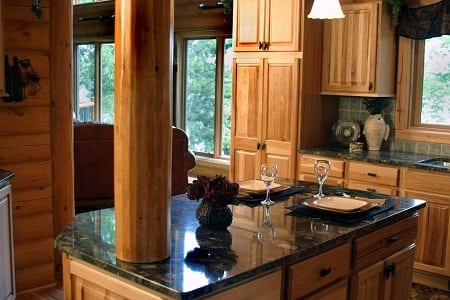 The countertop in your kitchen looms large, occupying a considerable amount of space. Evidently enough, the kitchen will wear a shabby look if the countertop is mucky. The kitchen is one area in your home that experiences, perhaps the maximum footfall as you use the space for cooking four square meals almost on an everyday basis.
The countertop in your kitchen looms large, occupying a considerable amount of space. Evidently enough, the kitchen will wear a shabby look if the countertop is mucky. The kitchen is one area in your home that experiences, perhaps the maximum footfall as you use the space for cooking four square meals almost on an everyday basis.
So, it does not need to be emphasized that your kitchen gets grimy and filthy sooner than you’d expect, and the countertop is the section that picks up the maximum stains and smudges. However, there are some common home cleaning tips that you can safely follow for keeping the kitchen countertop and splashback perfectly spic and span:-
- Mop clean oily or watery spills and trickles immediately
- Use mild cleansers for wiping, pouring by capfuls in hot or tepid water
- Use soft sponge and dry cotton cloth rags for mopping
- Let the countertop dry up fully before reusing the space
- Opt for professional resealing of the countertop once in a while
Outlined below are specific home cleaning guidelines for maintaining marble, laminate, copper, granite, ceramic, and stainless steel countertops.
Marble Countertops-Marble countertops add to the décor and ambiance of kitchens because of their glazy, polished, and smooth texture. But marble being porous, absorbs water, oil, and other fluids easily and copiously. At the same time, such a countertop is susceptible to getting abraded if you wipe using a strong cleanser containing lime juice or vinegar.
Swabbing with an absorptive, soft cloth using hot water and pH-neutral soap will not only give excellent results but also the safest technique.
Laminate Countertops-Laminates are as vulnerable as granite or marble to attracting stains and getting grazed from extensive use of corrosive cleaners and coarse sponges. Ensure to thoroughly dry the grouts and seams or else the laminate sections held in place with adhesives, will become loose and come apart.
Copper-Copper countertops undergo changes in appearance with the hue altering from dark red to brown to verdigris, owing to the intrinsic properties of the metal. Spills or dribbles on the countertop have an oxidative effect on copper thereby affecting the consistency or graininess of the surface. Light waxing or resealing helps prolong the lifecycle of the countertop.
Granite-Granite countertops can resist damage wrought by oil stains or hard water spills more effectively than marble or laminate but surely not immune to wear and tear. Make a paste from baking soda and water that is slightly alkaline and wipe gently, rubbing the paste away for removing deep-seated stains.
Ceramic-The grouts and ridges in ceramic tiles can get filled up with smudges and smears, leading to deposition of germs, mold, and mildew. Seal the tiles (if they aren’t already) and use a mild cleaner and tepid water for scrubbing out the stains. Deep cleanse the grouts periodically using a brush with nylon hairs and peroxide solution.
Stainless steel-Stainless steel can withstand abrasions caused by strong cleaners and rough brushes but is liable to attract water stains, fingerprints, and smears. Cleaners with special formulations for using on stainless steel surfaces are available which you can safely use for holding on to the material’s natural sheen.
Image Credit: shonflare
